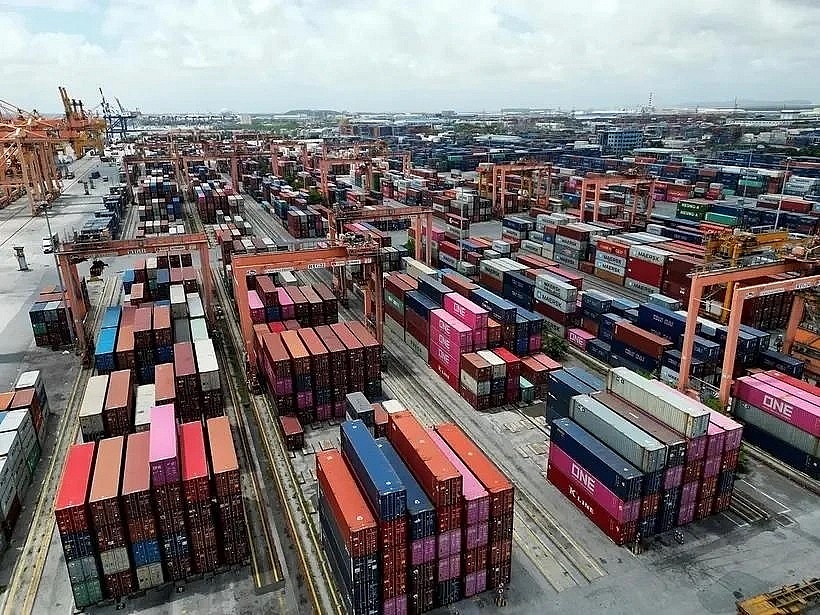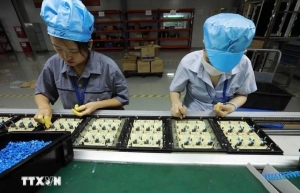Vietnam’s H1 economic growth quite impressive: ADB Country Director
 |
| Vietnam posts economic growth of 6.4 per cent in the first half of this year. (Photo: VNA) |
Hanoi - Country Director of the Asian Development Bank (ADB) for Vietnam Shantanu Chakraborty has expressed his impression of the Southeast Asian nation’s economic growth of 6.4 per cent in the first half of this year.
The growth was mainly driven by strong trade recovery, where export grew by 14.5 per cent and import by 17 per cent over last year, he told the Vietnam News Agency. However, he said, the domestic segment remained sluggish.
According to Chakraborty, apart from trade, rosy signs were also seen in production and foreign direct investment (FDI), with the Purchasing Managers' Index (PMI) in June standing at 54.7, providing an optimistic outlook on the manufacturing activity in the country.
Meanwhile, the bank’s report also shows increases in both registered capital and disbursement in the first six months.
Nguyen Ba Hung, ADB Chief Economist in Vietnam, said despite greater challenges predicted for the remaining months, the bank still maintains its optimistic view of 6 per cent for 2024, and 6.2 per cent for 2025.
Chakraborty held that this is “healthy growth” given the geopolitics and even internal and external challenges.
Vietnam can maintain its growth momentum in 2024 through sustained trade recovery in export-led manufacturing and positive inflows of FDI and remittances, while making more efforts for growth restoration in services, stable agriculture production, and domestic consumption recovery.
He said the country’s inflation is also expected to remain benign at 4.0 per cent in both 2024 and 2025, despite persistent pressure from geopolitical tensions and disruptions in global supply chains, lauding the State Bank of Vietnam (SBV) for its efforts in monetary policy management.
“We think the SBV did a very good job in terms of maintaining its monetary policy during a challenging time, maintaining a prudent monetary policy, balancing the need for growth, with the need to continue inflation. That's why we saw subdued inflation last year and yet a 5.05 per cent growth in GDP, which was one of the highest in the region,” he said.
Chakraborty noted that the window room to really play around with the monetary policy has now shrunk quite a bit, prompting the need to shift towards the fiscal policy to boost investment and public demand, with the two arms “fully synchronised”.
Regarding trade policies, Hung said one of the factors helping Vietnam attract foreign investors lies with free trade agreements that allow businesses based in the country to access more markets worldwide, thus serving investment and export models.
He suggested domestic firms enhance its engagement in supply chains of their FDI counterparts, which still remains poor, in order to better tap capital flows and serve development needs.
Chakraborty also warned that though the Vietnamese economy is expected to post a solid growth this year, there are several external risks that could slow down the momentum, including softened global demand caused by slow economic recovery among its trade partners and continued geopolitical tensions, both of which would hinder the recovery of Vietnam’s export-led growth, and the lower pace of the normalisation of interest rates in the US and other advanced economies, which would continue to put pressure on the exchange rate.
“Growth in 2024 also depends on effective implementation of the Government’s fiscal measures and public investment,” he said, stressing that policy measures would need to combine short-term growth support measures to strengthen domestic demand with long-term structural remedies to promote sustainable development.
Vietnam should strengthen its public investment to boost demand and employment, and other industries like construction, logistics, and transportation.
“That is the way to really come out without excessive dependence on monetary policy,” he explained.
Besides, reforms will help Vietnam maintain its competitive edge in the context that many countries in the region are coming up with world-class infrastructure and various incentives to attract especially high tech industries like AI and semiconductors, he said.
 | Vietnam among six ASEAN countries with good economic growth: Maybank The gross domestic product (GDP) growth of six ASEAN countries - Indonesia, Malaysia, the Philippines, Singapore, Thailand and Vietnam - will recover to 4.5 per cent and 4.7 per cent in 2024 and 2025, respectively, from 4 per cent in 2023, according to Maybank Research Pte Ltd forecast. |
 | Media urged to improve for economy The media has been playing an active role in shaping a healthier business and investment climate, and supporting the government in formulating sound policies. |
 | Gov’t unveils action plan to accelerate industrialisation The Vietnamese Government has outlined a comprehensive action plan to continue fasttracking the country's industrialisation and modernisation by 2030, with a long-term vision extending to 2045. |
What the stars mean:
★ Poor ★ ★ Promising ★★★ Good ★★★★ Very good ★★★★★ Exceptional
Related Contents
Latest News
More News
- Ho Chi Minh City launches plan for innovation and digital transformation (February 25, 2026 | 09:00)
- Vietnam sets ambitious dairy growth targets (February 24, 2026 | 18:00)
- Masan Consumer names new deputy CEO to drive foods and beverages growth (February 23, 2026 | 20:52)
- Myriad risks ahead, but ones Vietnam can confront (February 20, 2026 | 15:02)
- Vietnam making the leap into AI and semiconductors (February 20, 2026 | 09:37)
- Funding must be activated for semiconductor success (February 20, 2026 | 09:20)
- Resilience as new benchmark for smarter infrastructure (February 19, 2026 | 20:35)
- A golden time to shine within ASEAN (February 19, 2026 | 20:22)
- Vietnam’s pivotal year for advancing sustainability (February 19, 2026 | 08:44)
- Strengthening the core role of industry and trade (February 19, 2026 | 08:35)

 Tag:
Tag:




















 Mobile Version
Mobile Version